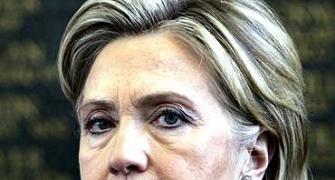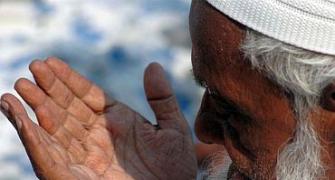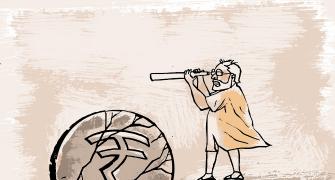In the recently-concluded state elections, a new alarming trend has come to the fore. In Assam and Kerala, it looks like the Muslim community's votes have polarised towards religious outfits.
The All India United Democratic Front in Assam and The Muslim League in Kerala secured good number of votes, leaving analysts to conclude that the Muslim electorate voted towards Muslim-oriented outfits.In this interview with rediff.com, member-secretary of the Rajinder Sachar Committee on the status of Muslims, Abusaleh Shariff explains the trend, its reasons and ways to reverse it.
In the recently concluded elections, Muslims seem to have voted along community lines in two states. Can you elaborate on this developement?
A. Well, it has been happening for a long time in Kerala. The Muslim League has been in existence since independence, so it has a historical legacy. Some political parties may not like the fact that it has the word 'Muslim' in it, but it is a recognised political party.
On the outset, I want to state that I am happy with the fact that the Muslims have awakened. I reiterate, awakened. I am aware through election results analysts that the share of Muslim electorate has been diminishing over the history of elections in India.
This means that Muslims were going out of the mainstream political system. This was not a good sign for the Muslims and the democracy because Muslims are the largest minority.
In these state elections, the emergence of the Muslim electorate is a good sign. I want more and more Muslims to come out in large numbers to exercise their democratic rights. That they are being polarised is another story.
Can this development be categorised as a trend?
Yes, it could be. I will tell you why. Mamta Bannerjee won in West Bengal and she was wholeheartedly supported by the Muslims in the state. Now if Mamta's policies do not include Muslims in it, then another Muslim oriented party can spring up there, which will then polarise on the Muslim vote-bank in the state.
In a secular and heterogeneous democracy such as ours, what is the meaning of such a development?
My democratic vision for this secular country is that Muslims should not be polarised in such a manner. They should be included and they should participate in mainstream politics.
I don't want a separate school, a separate minority development corporation etc. These are all notional; they don't produce any welfare products; it is just a waste of money. The government sustains these kind of institutions because of pressure. They only feed a handful of influential people.
What do you think are the reasons for Muslims to vote in favor of religious parties in Kerala and Assam?
When the mainstream political parties do not ask the Muslim community to be a part of the mainstream political system, then they don't get to exercise their identity. After all, being a Muslim is an identity.
In spite of the Sachar Committee report that came out five years ago, neither the state nor the central governments have taken it seriously. They have not addressed the problem of exclusion of Muslims in public spaces.
That is the reason why there is relatively more polarisation towards Muslim-oriented parties. Muslims think that through these parties, politically at least, they can make a claim in lieu of capacity to influence policies.
When I was in the Sachar Committee, what I noticed was that in most of the public spaces created by the system, Muslims were not getting their share. Every chapter in the committee report says that they are not a part of these spaces as much as they should be. So what is the solution for that?
They created special purpose vehicles for Muslims, which I am not for. I want a share for the Muslims in the mainstream institutions, which has declined over a period of time. The mainstream political parties should make spaces for them within the party. It will be easier for political decision making.
Do you think that the so-called religious political parties will truly represent Muslims' demands in mainstream politics?
Look, this is not a religious-oriented civil society. They are political parties and will have to participate in the nation building. But the point is that India constitutes of 1.3 billion people, out of which 1 billion are Hindus.
Unfortunately, despite the cultural divides amongst the Hindus, the Bharatiya Janata Party has put a seed of divide between Hindus and Muslims. This kind of polarisation is a result of what the BJP did 20 years ago. Although the BJP is trying to mellow down, the Muslim community is reacting.
See, through these religious parties, what the Muslim communities hope to achieve is representation in the mainstream. But unfortunately, in that case, what happens is that these demands will be made in a religious oriented manner, which is not healthy in a democratic setup.
Do you think these religious parties are just banking on religious votes, rather than in reality having a religious agenda?
I am not sure of that. But I think that we Muslims, being from the minority, have a strong desire to protect our identity. I don't call that a Muslim agenda, but rather an agenda to protect our identity. We need a place in nation building too.
Mainstream secular political parties have tried to woo Muslim votes in both states. Does this mean that the current policies and approaches adopted by these parties have failed?
What you have to understand is that the mainstream political parties have worked very hard to win their elections. Whether you like it or not, democracy is about numbers.
I am aware of the compulsion of mainstream parties to bring winning candidates. But my point is that they should use other institutions like delimitation commission.
For example in West Bengal, there will be 100 constituencies where Muslims might have a winning edge. Identity politics also works in secular parties, but these constituencies will also have Hindus, so in a secular party, even if the candidate is a Muslim, you will get Hindu votes as well.
The elected representative is going to be the leader of the Hindus and Muslims in the area. That is where inclusion comes. A Muslim getting elected should not be seen as a Muslim leader, but rather a leader.
Dr Manmohan Singh is seen as a leader and not a Sikh leader. Similarly, Muslims standing up to represent a constituency should not be labeled a religious leader.
This development, in itself, is alarming. How can we reverse such a development keeping the secular idea of the state in mind?
I won't call it alarming. But yes, voting based on identity and community is bad. Mainstream is the answer. Negotiation and partnership should be included.
Do you know why Muslim vote was polarised in Assam? The Congress leaders did not even allow Muslims to come near them for partnership. In Kerala, Muslim League fractions came together, so Muslim vote got consolidated.
My argument is not against the Muslims or Muslim parties. I ask of the government to change policies. They should open up public spaces for Muslims. It is because they have not, that Muslim polarisation is taking place.
What do you think are the key issues that Muslims want represented, which are not being focused on by secularist political parties?
Political empowerment. In 2006, Sachar Committee brought the fact that Muslims are not participating as much as they should in public spaces. The Sachar Committee told the government that more political representation is needed atleast at the grass-root level.
Don't make them members of Parliament and members of legislative assembly. Make them part of the Panchayat and Municipality atleast.
We need these small changes because these are the ways that we interpret what matters. In Sachar Committee report, it is highlighted that in Muslim concentrated areas, schools are less.
So where do they go, other that Madrassas? When we talk of welfare of Muslims, they talk of Madrassa reforms. Why Madrassa reforms, I ask, why not schools?








